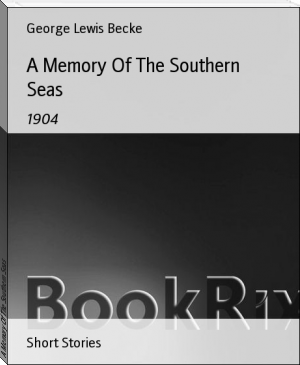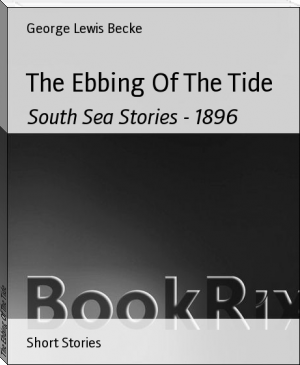By Rock and Pool on an Austral Shore - George Lewis Becke (mystery books to read txt) 📗

- Author: George Lewis Becke
Book online «By Rock and Pool on an Austral Shore - George Lewis Becke (mystery books to read txt) 📗». Author George Lewis Becke
A mile eastward from the shore there rises stark and clear a great dome-shaped rock, the haunt and resting-place of thousands of snow-white gulls and brown-plumaged boobies. The breeding-place of the former is within rifle-shot--over there on that long stretch of banked-up sand on the north side of the bar, where, amid the shelter of the coarse, tufted grass the delicate, graceful creatures will sit three months hence on their fragile white and purple-splashed eggs. The boobies are but visitors, for their breeding-places are on the bleak, savage islands far to the south, amid the snows and storms of black Antarctic seas. But here they dwell together, in unison with the gulls, and were the wind not westerly you could hear their shrill cries and hoarse croaking as they wheel and eddy and circle above the lonely rock, on the highest pinnacle of which a great fish-eagle, with neck thrown back upon his shoulders and eyes fixed eastward to the sun, stands oblivious of their clamour, as creatures beneath his notice.
Once round the southern side of the Signal Hill the noise of the bar is lost. Between the hill and the next point--a wild, stern-looking precipice of black-trap rock--there lies a half a mile or more of shingly strand, just such as you would see at Pevensey Bay or Deal, but backed up at high-water mark with piles of drift timber--great dead trees that have floated from the far northern rivers, their mighty branches and netted roots bleached white by the sun and wind of many years, and smelling sweet of the salty sea air. Mingled with the lighter bits of driftwood and heaps of seaweed are the shells of hundreds of crayfish--some of the largest are newly cast up by the sea, and the carapace is yellow and blue; others are burnt red by exposure to the sun; while almost at every step you crush into the thin backs and armoured tails of young ones about a foot in length, the flesh of which, by some mysterious process of nature, has vanished, leaving the skin, muscles, and beautiful fan-like tail just as fresh as if the crustaceans were alive. Just here, out among those kelp-covered rocks, you may, on a moonlight night, catch as many crayfish as you wish--three of them will be as much as any one would care to carry a mile, for a large, full-grown "lobster," as they are called locally, will weigh a good ten pounds.
Once round the precipice we come to a new phase of coastal scenery. From the high land above us green scrub-covered spur after spur shoots downward to the shore, enclosing numerous little beaches of coarse sand and many coloured spiral shells--"Reddies" we boys called them--with here and there a rare and beautiful cowrie of banded jet black and pearly white. The sea-wall of rock has here but few pools, being split up into long, deep, and narrow chasms, into which the gentle ocean swell comes with strange gurglings and hissings, and groan-like sounds, and tiny jets of spray spout up from hundreds of air-holes through the hollow crust of rock. Here for the first time since the town was left, are heard the cries of land birds; for in the wild apple and rugged honeysuckle trees which grow on the rich, red soil of the spurs they are there in plenty--crocketts, king parrots, leatherheads, "butcher" and "bell" birds, and the beautiful bronze-wing pigeon--while deep within the silent gullies you constantly hear the little black scrub wallabies leaping through the undergrowth and fallen leaves, to hide in still darker forest recesses above.
There are snakes here, too. Everywhere their sinuous tracks are visible on the sand, criss-crossing with the more defined scratchy markings of those of iguanas. The latter we know come down to carry off any dead fish cast ashore by the waves, or to seize any live ones which may be imprisoned in a shallow pool; but what brings the deadly brown and black snakes down to the edge of salt water at night time?
Point after point, tiny bay after bay, and then we come to a wider expanse of clear, stoneless beach, at the farther end of which a huge boulder of jagged, yellow rock, covered on the summit with a thick mantle of a pale green, fleshly-leaved creeper, bearing a pink flower. It stands in a deep pool about a hundred yards in circumference, and as like as not we shall find the surface of the water covered by thousands of green-backed, red-billed garfish and silvery mullet, whose very numbers prevent them from escaping. Scores of them leap out upon the sand, and lie there with panting gill and flapping tail. It is a great place for us boys, for here at low tides in the winter we strip off, and with naked hands catch the mullet and gars and silvery-sided trumpeters, and throw them out on the beach, to be grilled later on over a fire of glowing honeysuckle cobs, and eaten without salt. What boy does care about such a thing as salt at such times, when his eye is bright and his skin glows with the flush of health, and the soft murmuring of the sea is mingling in his ears with the thrilling call of the birds, and the rustling hum of the bush; and the yellow sun shines down from a glorious sky of cloudless blue, and dries the sand upon his naked feet; and the very joy of being alive, and away from school, is happiness enough in itself!
For here, by rock and pool on this lonely Austral beach, it is good and sweet for man or boy to be, and, if but in utter idleness, to watch and listen--and think.
Solepa
The last strokes of the bell for evening service had scarce died away when I heard a footstep on the pebbly path, and old Pakia, staff in hand and pipe dangling from his pendulous ear-lobe, walked quietly up the steps and sat down cross-legged on the verandah. All my own people had gone to church and the house was very quiet.
"Good evening, Pakia," I said in English, "how are you, old man?"
A smile lit up the brown, old, wrinkled face as he heard my voice--for I was lying down in the sitting-room, smoking my after-supper pipe--as he answered in the island dialect that he was well, but that his house was in darkness and he, being lonely, had come over to sit with me awhile.
"That is well, Pakia, for I too am lonely, and who so good as thee to talk with when the mind is heavy and the days are long, and no sail cometh up from the sea-rim? Come, sit here within the doorway, for the night wind is chill; and fill thy pipe."
He came inside as I rose and turned up the lamp so that its light shone full on his bald, bronzed head and deeply tatooed arms and shoulders. Laying down his polished staff of temana wood, he came over to me, placed his hand on my arm, patted it gently, and then his kindly old eyes sought mine.
"Be not dull of heart, taka taina.[1] A ship will soon come--it may be to-morrow; it must be soon; for twice have I heard the cocks crow at midnight since I was last here, three days ago. And when the cocks crow at night-time a ship is near."
"May it be so, Pakia, for I am weary of waiting. Ten months have come and gone since I first put foot on this land of Nukufetau, and a ship was to have come here in four."
He filled his pipe, then drawing a small mat near my lounge, he squatted on the floor, and we smoked in silence, listening to the gentle lapping of the lagoon waters upon the inner beach and the beating, never-ceasing hum of the surf on the reef beyond. Overhead the branches of the palms swayed and rustled to the night-breeze.
Presently, as I turned to look seaward, I caught the old man's dark eyes fixed upon my face, and in them I read a sympathy that at that time and place was grateful to me.
"Six months is long for one who waits, Pakia," I said. "I came here but to stay four months and trade for copra; then the ship was to call and take me to Ponape, in the far north-west. And Ponape is a great land to such a man as me."
"Etonu! Etonu! I know it. Thrice have I been there when I sailed in the whaleships. A great land truly, like the island called Juan Fernandez, of which I have told thee, with high mountains green to the summits with trees, and deep, dark valleys wherein the sound of the sea is never heard but when the surf beats hard upon the reef. Ah! a fine land--better than this poor motu, which is as but a ring of sand set in the midst of the deep sea. Would that I were young to go there with thee! Tell me, dost know the two small, high islands in the ava[2] which is called Jakoits? Hast seen the graves of two white men there?"
"I know the islands well; but I have never seen the graves of any white men there. Who were they, and when did they die?"
"Ah, I am a foolish old man. I forget how old I am. Perhaps, when thou wert a child in thy mother's arms, the graves stood up out of the greensward at the foot of the high cliff which faces to the south. Tell me, is there not a high wall of rock a little way back from the landing beach?... Aye!... that is the place ... and the bones of the men are there, though now great trees may grow over the place. They were both good men--good to look at, tall and strong; and they fought and died there just under the cliff. I saw them die, for I was there with the captain of my ship. We, and others with us, saw it all."
"Who were they, Pakia, and how came they to fight?"
"One was a trader, whose name was Preston; he lived on the mainland of Ponape, where he had a great house and oil store and many servants. The name of





Comments (0)